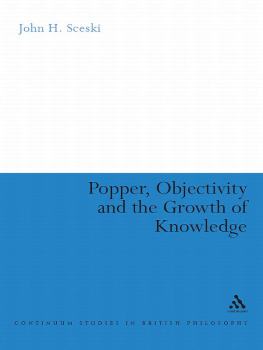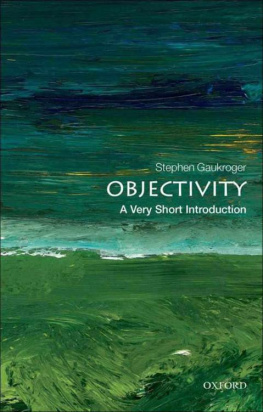Sceski - Popper, Objectivity and the Growth of Knowledge
Here you can read online Sceski - Popper, Objectivity and the Growth of Knowledge full text of the book (entire story) in english for free. Download pdf and epub, get meaning, cover and reviews about this ebook. year: 2007;2011, publisher: Continuum International Publishing Group;Bloomsbury Publishing Plc, genre: Romance novel. Description of the work, (preface) as well as reviews are available. Best literature library LitArk.com created for fans of good reading and offers a wide selection of genres:
Romance novel
Science fiction
Adventure
Detective
Science
History
Home and family
Prose
Art
Politics
Computer
Non-fiction
Religion
Business
Children
Humor
Choose a favorite category and find really read worthwhile books. Enjoy immersion in the world of imagination, feel the emotions of the characters or learn something new for yourself, make an fascinating discovery.
- Book:Popper, Objectivity and the Growth of Knowledge
- Author:
- Publisher:Continuum International Publishing Group;Bloomsbury Publishing Plc
- Genre:
- Year:2007;2011
- Rating:5 / 5
- Favourites:Add to favourites
- Your mark:
- 100
- 1
- 2
- 3
- 4
- 5
Popper, Objectivity and the Growth of Knowledge: summary, description and annotation
We offer to read an annotation, description, summary or preface (depends on what the author of the book "Popper, Objectivity and the Growth of Knowledge" wrote himself). If you haven't found the necessary information about the book — write in the comments, we will try to find it.
Sceski: author's other books
Who wrote Popper, Objectivity and the Growth of Knowledge? Find out the surname, the name of the author of the book and a list of all author's works by series.
Popper, Objectivity and the Growth of Knowledge — read online for free the complete book (whole text) full work
Below is the text of the book, divided by pages. System saving the place of the last page read, allows you to conveniently read the book "Popper, Objectivity and the Growth of Knowledge" online for free, without having to search again every time where you left off. Put a bookmark, and you can go to the page where you finished reading at any time.
Font size:
Interval:
Bookmark:

POPPER, OBJECTIVITY AND THE
GROWTH OF KNOWLEDGE
Also available from Continuum:
Descartes and the Metaphysics of Human Nature, by Justin Skirry
Kierkegaards Analysis of Radical Evil, by David A. Roberts
Nietzsche and the Greeks, by Dale Wilkerson
Rousseaus Theory of Freedom, by Matthew Simpson
Leibniz Reinterpreted: The Harmony of Things, by Lloyd Strickland
Poppers Theory of Science, by Carlos Garcia
Dialectic of Romanticism, by David Roberts and Peter Murphy
Tolerance and the Ethical Life, by Andrew Fiala
Aquinas and the Ship of Theseus, by Christopher M. Brown
Demands of Taste in Kants Aesthetics, by Brent Kalar
Philosphy of Miracles, by David Corner
Platonism, Music and the Listeners Share, by Christopher Norris
St Augustine and the Theory of Just War, by John M. Mattox
St Augustine of Hippo, by R. W. Dyson
Wittgensteins Religious Point of View, by Tim Labron
POPPER, OBJECTIVITY AND THE
GROWTH OF KNOWLEDGE
JOHN H. SCESKI

Continuum International Publishing Group
The Tower Building, 11 York Road, London SE1 7NX
80 Maiden Lane, Suite 704, New York, NY 10038
John H.Sceski 2007
All rights reserved. No part of this publication may be reproduced or transmitted in any form or by any means, electronic or mechanical, including photocopying, recording, or any information storage or retrieval system, without prior permission in writing from the publishers.
British Library Cataloguing-in-Publication Data
A catalogue record for this book is available from the British Library.
| ISBN: | HB: | 0-8264-8904-4 |
| 9780826489043 |
Library of Congress Cataloging-in-Publication Data
Sceski.JohnH.
Popper, objectivity and the growth of knowledge / by John H. Sceski.
p. cm. - (Continuum studies in British philosophy)
Includes bibliographical references and index.
ISBN-13: 978-0-8264-8904-3
ISBN-10: 0-8264-8904-4
1. Popper, Karl Raimund, Sir, 1902-1994. 2. Objectivity.
3. Science - Methodology. 4. Cosmology. I. Title II. Series.
B1649.P64S34 2007
192 - dc 22
2006028507
Dedicated with love to my wife Renee and to the blessings that keep us whole: Blaise, Collin, Magdalen, Dominic, Clare, and Eileen
Contents
Preface
As far as humans can tell, objectivity is a problem for them alone. Like humans other organisms struggle to secure their place in the world; nevertheless, the intriguing questions of whether they are deceived by their coping mechanisms, the unique status of their subjective contributions in opposition to contributions from the environment, and how to situate themselves in light of such a distinction, never seems to engage the attention of other living things that share this planet with us. As well, it makes little sense to assert that God and the angels struggle with this problem. The former knows too much and concerning the latter too little is known. Moreover, God and non-human organisms share a marked similarity: in each case their knowing and the object of knowledge are one. God knows all things in knowing himself, and non-human organisms view their knowledge and the world as one until they are selected out, and then it is too late for them to know anything. Thus, our best guess is that the problem of objectivity, like many other problems, is distinctively human. To say this may not be very informative except that it highlights an important contrast: unlike God who does not make mistakes and unlike non-human organisms who make mistakes but do not recognize them as mistakes, humans both make mistakes about the objective status of things and are often painfully aware of their errors as errors. Thus the problem of objectivity arises for us as the occasion of error forces us to reflect upon the gap between our subjective commitments and a world recalcitrant to our best laid schemes.
Accordingly, the problem of objectivity has ontological and epistemological dimensions. Concerning the former, a central question is what is it about the reality of things that entitles us to designate cabbages and computers and interior states such as beliefs and desires as both real, yet different? This is a question about the status of things as real and the distinctions that can be made between them; in philosophical jargon it is a question about the objective ontological status of various states of affairs. The epistemological dimension of the problem has been a special focus of philosophy since the Renaissance and distinctively characteristic of Enlightenment thought. The epistemological issue concerns the defining features, scope, and veracity of human knowing in reference to our judgments about the world. Centrally, the epistemological problem of objectivity asks what the constraints on our knowledge claims are, and if there are any how do we know there are, and are any of these constraints mind-independent? These issues arise in the light of our recognition of human fallibility. As indicated above, we are often mistaken concerning what we claim to know and the responsibility is ours alone. Thus a major issue for us is how can we control error and what role does a mind-independent reality play in that control? The notion guiding Renaissance and Enlightenment philosophical endeavors is that to answer the epistemological problem of error control can help us to attain a favorable perspective on the status of things. However, contemporary philosophers of all persuasions, if not disenchanted with Enlightenment aims are disappointed with the epistemological and metaphysical arguments for realizing them. Moreover, the linguistic emphases of contemporary philosophers provide little help in addressing the problem of objectivity if only because they have rejected the possibility of objective problems.
Among Western philosophers, Karl Popper provides a singular contribution to the problem of error control and thereby his thought is uniquely situated to address both dimensions of the problem of objectivity. The aim of this work is a critical exposition of Karl Poppers philosophy placing special emphasis on his treatment of objectivity. To this end, I examine his general account of rationality and philosophical methodology (Chapter 1), his treatment of particular problems in the philosophy of science and cosmology (Chapters 2 and 3), and his arguments for an objective social order where political and sociological questions are addressed (Chapter 4). Finally, at the conclusion of the monograph I extend his treatment of objectivity to morals and provide a sketch of a genuine Popperian ethics. I assert that Poppers philosophy provides the best framework to answer all questions concerning objectivity: epistemological, metaphysical, political, linguistic, and ethical.
In the name of error control I have of course consulted the works of other thinkers, especially those who address Poppers contributions to philosophy. Among these David Miller deserves special acknowledgement, and I would add respect. Millers writings merit serious attention not only as an exposition of Poppers thought but also for their resourceful development and extension of Poppers philosophy of critical rationalism. Miller deserves much credit for the distinctions between classifying statements as true and believing them to be true, and methodological skepticism and epistemological skepticism; additionally, he has gone farther than Popper in exploring the nature of deductive inference and assessing its contribution to rational nquiry; lastly, his technical expositions of key issues for critical rationalism (verisimilitude, inductive probability) have significantly advanced the debate in their respective domains.
Font size:
Interval:
Bookmark:
Similar books «Popper, Objectivity and the Growth of Knowledge»
Look at similar books to Popper, Objectivity and the Growth of Knowledge. We have selected literature similar in name and meaning in the hope of providing readers with more options to find new, interesting, not yet read works.
Discussion, reviews of the book Popper, Objectivity and the Growth of Knowledge and just readers' own opinions. Leave your comments, write what you think about the work, its meaning or the main characters. Specify what exactly you liked and what you didn't like, and why you think so.













